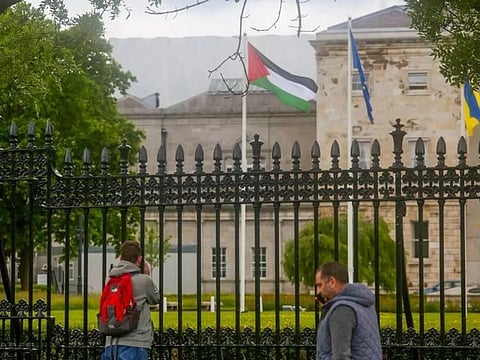Recognition of Palestine is a necessary step for peace
In a series of diplomatic disasters, Israel appears to be risking all through hubris

Recent days have been a diplomatic disaster for Israel, the worst in its short history. The series of political and legal debacles might pave the way for future losses in the international arena that will almost certainly lead to making Israel a pariah.
On May 20, the International Criminal Court (ICC) Prosecutor Karim Khan said he had requested arrest warrants for Israeli Prime Minister Benjamin Netanyahu, his Defense Minister Yoav Gallant, and three Hamas leaders, including its Gaza-based chief Yahya Sinwar and political head Ismail Haniyeh.
Charges against the senior Israeli leaders include alleged war crimes, crimes against humanity, starvation of civilians, and extermination during Israel’s war on Gaza. Hamas leaders also face several charges, including torture, taking of hostages, and murder.
It was more than a rebuke of Israel’s war in Gaza and its political and military leadership. As expected, Tel Aviv’s reaction was denial. Netanyahu said the ICC’s announcement was “a big mistake,” while Israeli politicians from all sides attacked the ICC for conflating a democratic government with a terrorist organisation.
Germany, a close ally of Israel, announced that if the warrants are issued, it will have no option but to arrest Netanyahu if he sets foot on its territory. Almost all EU countries said they would abide by the ICC’s decision. More than 120 countries are parties to the Rome Statute of the ICC.
Other EU countries to follow
Less than 48 hours later came the second blow when three European countries, Ireland, Spain, and Norway, announced that they were recognising an independent Palestinian state along the 1967 borders with East Jerusalem as its capital. The announcement triggered a hysteric backlash by Israel, which said the move rewards terrorists.
In contrast, the EU’s foreign policy Chief Josep Borrell said the decision was not a gift to Hamas but reinforcing the legitimate Palestinian Authority (PA). Other EU countries are expected to do the same.
While Israeli and pro-Israel US politicians attacked the ICC and the trilateral recognition of Palestine, Israel was having a hard time making gains in war-torn Gaza. The fight had become the fiercest in northern Gaza since Israel declared that it had cleared the area from Hamas. It was becoming clear that the 8-month-long military operation was close to a stalemate.
Meanwhile, pressure on the Netanyahu government by Israeli hostage families was mounting to reach a deal. Earlier, former defence minister Benny Gantz and a member of the war cabinet issued an ultimatum to Netanyahu to accept a day-after scenario for Gaza that does not involve occupation or face the consequences, including his withdrawal from the coalition, putting pressure to call for early elections.
As Israel was grappling with the international fallout from two heavy blows, the Israeli army confirmed that before the outbreak of the Gaza war, it had warned Netanyahu that the crisis over the judicial overhaul was encouraging Iran, Hezbollah, and Hamas to risk potential action against Israel. It said it had done so on four previous occasions.
Netanyahu quickly denied that the army had warned him before Oct. 7 of the increasing danger of war. Facing harsh criticism on the home front, Netanyahu became more vulnerable and erratic in his decisions.
And to make things worse, on 24 May, the International Court of Justice (ICJ) issued a ruling, at South Africa’s request, ordering Israel to halt its offensive on Rafah, which it had launched more than a week before, citing “immense risk” to the Palestinian population.
In addition, the court, in an almost unanimous ruling, ordered Israel to “immediately halt its military offensive and any other action in the Rafah Governorate. It also ordered Israel to allow investigators to enter the enclave while making sure that unhindered delivery of humanitarian aid is implemented.
Political isolation of Israel
The binding ruling was once more met with defiance and rejection by the Israeli government, putting it at risk of total political isolation.
Meanwhile, in New York, the United Nations Security Council passed a resolution denouncing attacks on UN staff and aid workers in conflict zones as record numbers of UN personnel have been killed in Israel’s war on the Gaza Strip, according to Al Jazeera.
The resolution, which calls on all countries to protect humanitarian workers under international law, passed on Friday with 14 votes in favour, zero against, and one abstention by the US.
Israel’s defiance of such resolutions and rulings is not helping its cause. In response, it has decided to stop remitting tax funds to the PA, which is close to financial collapse, revoke a law to abandon certain illegal settlements in the West Bank and prevent Palestinians from contacting the Spanish consulate in East Jerusalem while considering terminating diplomatic ties with some countries. Netanyahu has asserted that there will never be a Palestinian state.
Israel is testing the international rules-based order and underlining that it is the exception and that it’s above accountability. Such an attitude is putting Israel, as a nation, one that the Arabs said would recognise under the 2002 Arab Peace Initiative, at risk of isolation and sanctions.
Osama Al Sharif is a journalist and political commentator based in Amman.



